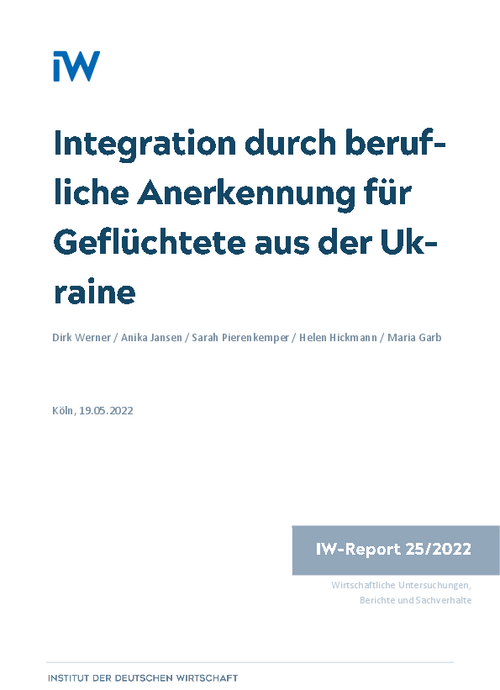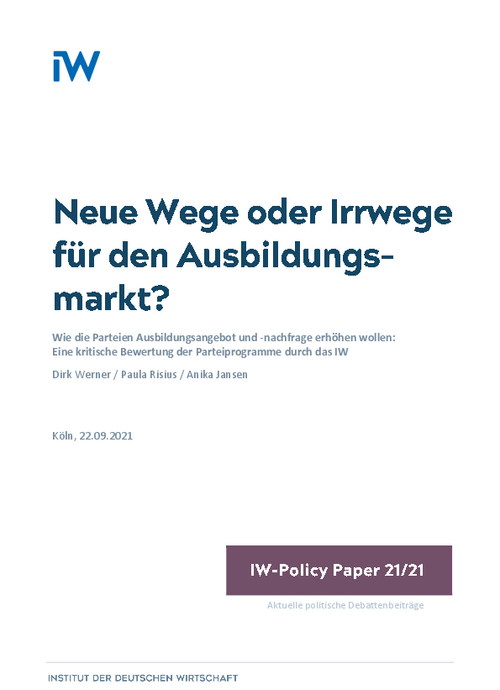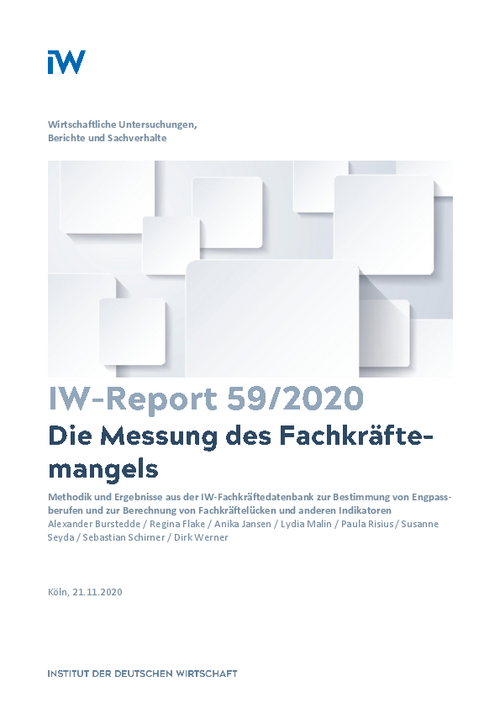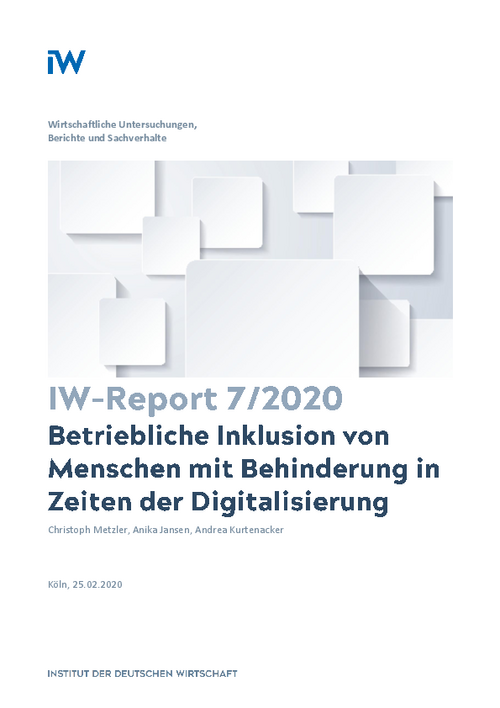Please switch to a modern browser (e.g. Google Chrome, Firefox or Microsoft Edge) in order to enjoy the best user experience.

Economist für Fachkräftesicherung
Tel: +49 221 4981-681 Mail: jansen@iwkoeln.deResearch unit
Werner, Dirk / Jansen, Anika / Pierenkemper, Sarah / Hickmann, Helen / Garb, Maria, 2022, Integration durch berufliche Anerkennung für Geflüchtete aus der Ukraine, IW-Report, Nr. 25, Köln
Zur Studie
Werner, Dirk / Risius, Paula / Jansen, Anika, 2021, Neue Wege oder Irrwege für den Ausbildungsmarkt? Wie die Parteien Ausbildungsangebot und -nachfrage erhöhen wollen: Eine kritische Bewertung der Parteiprogramme durch das IW, IW-Policy Paper, Nr. 21, Köln
Zur Studie
(in cooperation with Lydia Malin, Susanne Seyda, Regina Flake)
Fachkräftesicherung in Deutschland – diese Potenziale gibt es noch
Studie für das Kompetenzzentrum Fachkräftesicherung (KOFA), 2019
(in cooperation with Alexander Burstedde, Annina Hering, Sarah Pierenkemper, Sibylle Stippler)
Wie Unternehmen trotz Fachkräftemangel Mitarbeiter finden
Studie des Kompetenzzentrums Fachkräftesicherung (KOFA) in Zusammenarbeit mit der Jobseite Indeed und der Zeitschrift Personalwirtschaft, 2019
(in cooperation with Regina Flake, Lydia Malin)
Wie Unternehmen Beschäftigungspotenziale von Frauen noch besser nutzen können - Flexible Arbeitszeitmodelle ermöglichen Frauen den Schritt in Männerberufe
Studie für das Kompetenzzentrum Fachkräftesicherung (KOFA), 2019
(in cooperation with Paula Risius, Lydia Malin, Sebastian Schirmer, Dirk Werner)
Fachkräftecheck Metall- und Elektroberufe – Analyse der Fachkräftesituation
Studie für das Kompetenzzentrum Fachkräftesicherung (KOFA), 2018
(in cooperation with Paula Risius, Lydia Malin, Sebastian Schirmer, Dirk Werner)
Fachkräftecheck Metall- und Elektroberufe in Hessen – Analyse der Fachkräftesituation in Hessen
Studie für das Kompetenzzentrum Fachkräftesicherung (KOFA), 2018
(in cooperation with Pilar Pineda-Herrero)
Dual Apprenticeships in Spain – Catalonia: The Firm's Perspective
Vocations and Learning. Studies in Vocational and Professional Education
https://link.springer.com/article/10.1007/s12186-018-09217-6
(in cooperation with A. de Grip, B. Kriechel)
The effect of choice options in training curricula on the demand for and supply of apprentices
Economics of Education Review, Vol. 57, 2017, pp. 52–65
(in cooperation with H.U. Pfeifer)
Pre-training competencies and the productivity of apprentices
Evidence-based HRM: a global forum for empirical scholarship, Vol. 5, No. 1, 2017, pp. 59–79
(in cooperation with S. Horn, N. Nguyen)
Costs and benefits of company-based training in Vietnam - Chances and limitations of applying the BIBB cost-benefit model
Berufsbildung in Wissenschaft und Praxis, Vol. 3, 2016, pp. 40–43
(in cooperation with M.S. Leiser, F. Wenzelmann, S.C. Wolter
Labour market deregulation and apprenticeship training: A comparison of German and Swiss employers
European Journal of Industrial Relations, Vol. 21, No. 4, 2015, pp. 353–368
(in cooperation with M. Neumann)
Durch Wachstum zum Wohlbefinden
WiSt-Wirtschaftswissenschaftliches Studium, Vol. 43, No. 9, 2014, pp. 484–490

Russia's war of aggression against Ukraine has triggered a wave of refugees, in the course of which many Ukrainians have already come to Germany and more are still to come. For the refugees, protection, childcare and family care are priorities.
IW

Some of the demands made by the political parties in their election programs for the federal elections are specifically aimed at increasing the demand for and supply of vocational education and training. In this analysis, the measures are evaluated economically based on empirical data and previous research findings.
IW

The present IW-Report introduces a new methodology for measuring the shortage of skilled workers and thus makes a central contribution to mapping the skilled worker situation in Germany. First, a definition of the term "shortage of skilled workers" is presented. Afterwards, its operationalization is discussed.
IW

Digitization has a positive influence on the inclusion of people with disabilities in German companies. Companies that already rely heavily on digitization today employ more people with disabilities than companies that currently do not have any reference to digitization.
IW